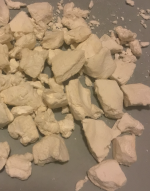- Joined
- Dec 29, 2021
- Messages
- 102
- Reaction score
- 39
- Points
- 18
Eis o que fiz numa escala mais pequena;
1. Solução IPA/H2O 2:1 ((IPA 800ml,H2O 400ml)(1200ml)) foi adicionada a um balão de 2000ml.
2. Adicionou-se NaBH4 (116 g) de uma só vez e iniciou-se a agitação.
3. Adicionou-se P2NP (67 g) em pequenas porções, de modo que a temperatura da mistura não excedesse 60 *С.
4. CuCl2 (7 g) em água (13 ml) foi adicionado lentamente gota a gota, de modo que a temperatura da mistura não excedeu 80 *С.
5. Em seguida, a reação foi refluxada a 80 °C durante 30 minutos, utilizando aquecimento externo.
6. A solução é decantada e filtrada dos resíduos da reação e colocada num funil de separação.
7. Adicionou-se à mistura reacional uma solução aquosa de NaOH a 25% (533 ml) e as fases foram separadas.
8. Escorrer a camada inferior para um copo grande e recolher a camada orgânica superior.
9. A fase aquosa foi então colocada no funil de separação e extraída com 500 ml de IPA.
10) O IPA foi evaporado em 3/4, metade da freebase leitosa e metade do IPA.
11.O IPA e a base livre foram dissolvidos em 130ml de acetona.
12. o ácido ortofosfórico foi gotejado até pH - 6 (com agitação constante).
13. a mistura foi colocada no congelador durante 12 horas.
14. após a cristalização, a suspensão foi filtrada e lavada com acetona fria e seca, até que a acetona esteja limpa.
15) A acetona resultante da lavagem e a mistura ipa/acetona são novamente colocadas no congelador para nova precipitação.
16. processo repetido até que não haja mais precipitado para produzir 60-70% de anfetamina de alta qualidade, à medida que a mistura vai ficando com mais acetona, pode ser necessário pingar um pouco mais de ácido para a reduzir, mas não demasiado, pois a acetona é ph7.
Aqui está uma foto de algumas das pedras de pasta seca, o resto é pó seco para ser misturado, pois é demasiado forte para mim e para os meus amigos.
Poderei atualizar a receita e fazer um artigo para o químico caseiro de pequena escala, pois há muitas formas de a melhorar.
1. Solução IPA/H2O 2:1 ((IPA 800ml,H2O 400ml)(1200ml)) foi adicionada a um balão de 2000ml.
2. Adicionou-se NaBH4 (116 g) de uma só vez e iniciou-se a agitação.
3. Adicionou-se P2NP (67 g) em pequenas porções, de modo que a temperatura da mistura não excedesse 60 *С.
4. CuCl2 (7 g) em água (13 ml) foi adicionado lentamente gota a gota, de modo que a temperatura da mistura não excedeu 80 *С.
5. Em seguida, a reação foi refluxada a 80 °C durante 30 minutos, utilizando aquecimento externo.
6. A solução é decantada e filtrada dos resíduos da reação e colocada num funil de separação.
7. Adicionou-se à mistura reacional uma solução aquosa de NaOH a 25% (533 ml) e as fases foram separadas.
8. Escorrer a camada inferior para um copo grande e recolher a camada orgânica superior.
9. A fase aquosa foi então colocada no funil de separação e extraída com 500 ml de IPA.
10) O IPA foi evaporado em 3/4, metade da freebase leitosa e metade do IPA.
11.O IPA e a base livre foram dissolvidos em 130ml de acetona.
12. o ácido ortofosfórico foi gotejado até pH - 6 (com agitação constante).
13. a mistura foi colocada no congelador durante 12 horas.
14. após a cristalização, a suspensão foi filtrada e lavada com acetona fria e seca, até que a acetona esteja limpa.
15) A acetona resultante da lavagem e a mistura ipa/acetona são novamente colocadas no congelador para nova precipitação.
16. processo repetido até que não haja mais precipitado para produzir 60-70% de anfetamina de alta qualidade, à medida que a mistura vai ficando com mais acetona, pode ser necessário pingar um pouco mais de ácido para a reduzir, mas não demasiado, pois a acetona é ph7.
Aqui está uma foto de algumas das pedras de pasta seca, o resto é pó seco para ser misturado, pois é demasiado forte para mim e para os meus amigos.
Poderei atualizar a receita e fazer um artigo para o químico caseiro de pequena escala, pois há muitas formas de a melhorar.
Attachments
- Joined
- Jul 2, 2023
- Messages
- 17
- Reaction score
- 9
- Points
- 3
isto não é metanfetamina, podem escrever a partir daqui sobre como chegar a metanfetamina cristalina
- Language
- 🇺🇸
- Joined
- Oct 27, 2024
- Messages
- 31
- Reaction score
- 8
- Points
- 8
Um processo diferente. P2P ou sudo. Basta escolher um. Mas estes são mais seguros, na minha opinião


